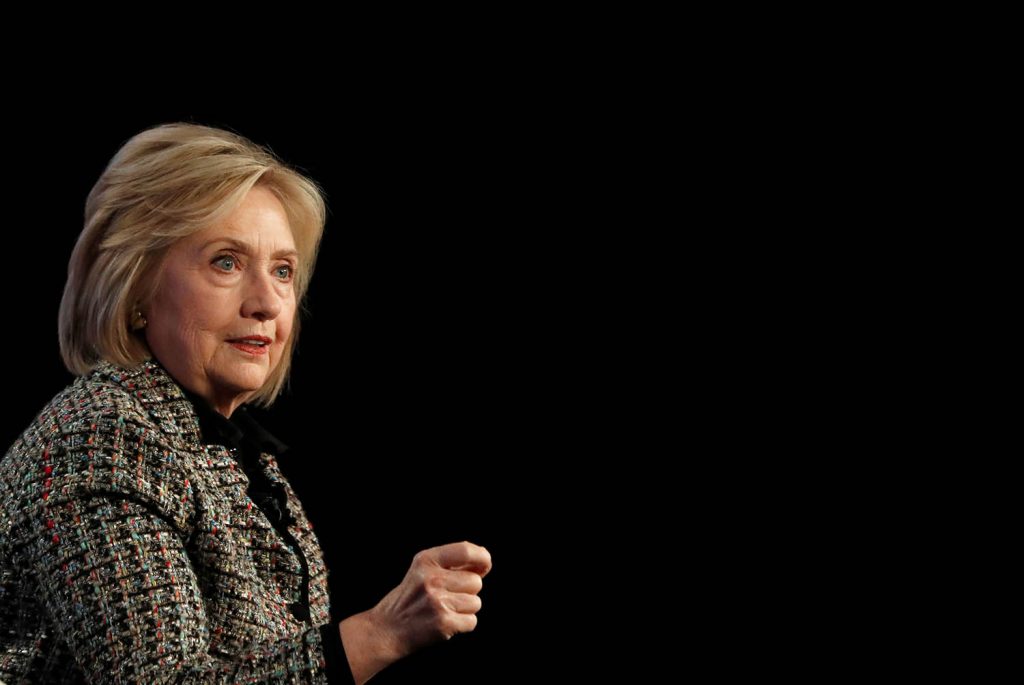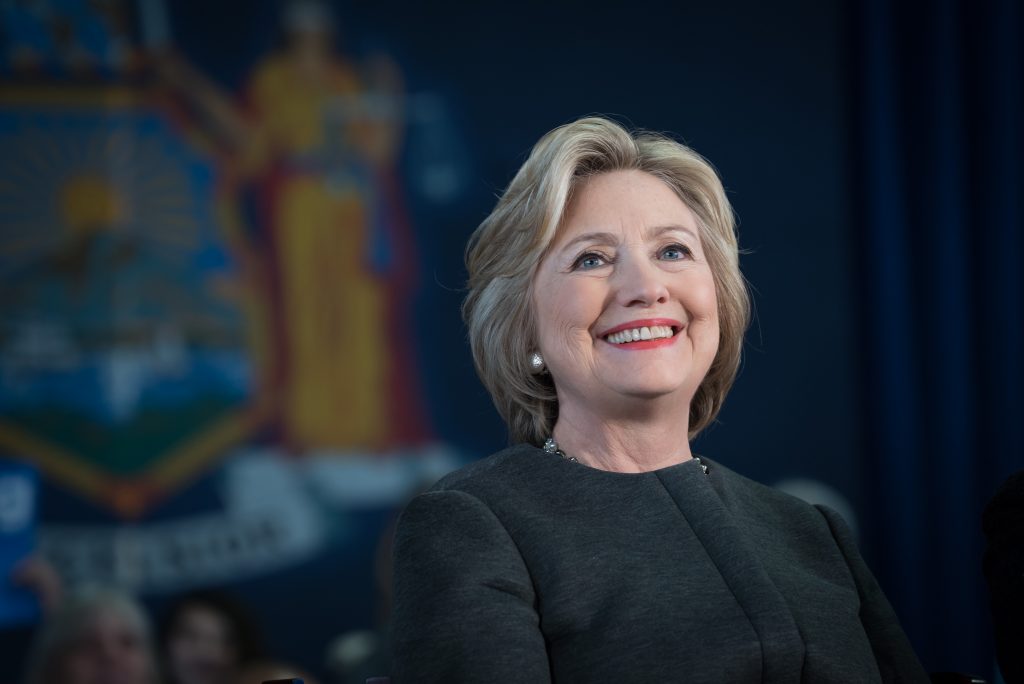Key takeaway: Ahead of the Democratic National Convention, former US Secretary of State Hillary Clinton said that if Joe Biden and his running mate Kamala Harris win the 2020 US presidential election, they will have to be prepared to advance on several domestic and international fronts simultaneously because the work before them will be “rather overwhelming.”
During an Atlantic Council Front Page event broadcast on August 17, Clinton told Frederick Kempe, president and CEO of the Atlantic Council, that “we’re going to have to quickly move to try to regain leadership and rebuild our alliances and make clear to our competitors and adversaries that… the vacuum is no more, that the United States is going to resume a position of global leadership and bring people together around common threats, whether it be climate change or the global pandemic.”
Here’s a rundown of what the 2016 Democratic presidential nominee had to say on the extraordinary stakes of the 2020 election, the international effort needed to overcome the pandemic, the trajectory of US-China relations, and more. The discussion launched the Atlantic Council’s Elections 2020: America’s Role in the World series of high-level conversations on the top foreign-policy priorities for the next four years.
Watch the full event
This is no “ordinary” election
- Great Recession x 4: “This is not an ordinary time,” Clinton asserted, noting that in conversations “with the vice president, the vice president’s campaign, now increasingly with those in the transition effort that is underway” she’s been reminded of when then-President-elect Barack Obama asked her to be his secretary of state. “He said … ‘I have to deal with the economic crisis, but we also have problems around the world. We have neglected our leadership and our alliances in the prior eight years,’” Clinton recalled. “Well, I think you just have to quadruple that to understand what President-elect Biden might be facing.”
- A race to ensure free and fair elections: Clinton noted that the Russian government, which interfered in the 2016 presidential election in which she ran, is at it again in 2020. She warned that the United States only had around eighty days left “to try to make sure that we have a free and fair election without foreign interference so that the maximum number of eligible Americans are able to vote, and their votes be counted, so that we are confident in the outcome of the election in November.”
- Harris a compelling VP choice: Reacting to Biden’s choice of California Senator Kamala Harris as his running mate, Clinton said she thought Harris’s “incredible energy, her experience, her story, life story, will be very compelling in this election. And having both campaigned with her and for her, I have seen first-hand how thoughtful and focused she can be.”
The US alone can’t combat the pandemic
- Fight vaccine nationalism—don’t fuel it: Criticizing President Donald Trump’s efforts to withdraw the United States from the World Health Organization, Clinton argued that the US should be ramping up support for the WHO and the international vaccine institution GAVI. “We should be having intense diplomatic conversations with health experts, logistics experts, and others about how we are going to finally get to a safe and effective vaccine, or perhaps even more than one, and then manage the distribution of it so that we try to bring the world together around defeating the pandemic, not permit the vaccine nationalism that is taking place right now,” she said.
- No success from the sidelines: The US “cannot sit on the sidelines being indifferent or even contemptuous of international efforts and expect that we’re going to benefit ourselves, as well as lead the world,” Clinton added. “To think that we can, you know, shut ourselves off and pretend as though we can deal with it on our own is both scientifically and politically, and strategically I would say, false.”
A need to set US-China relations on a steadier course
- China is filling a vacuum, and the US is responsible: Clinton argued that the Trump administration’s “incoherent and inconsistent policies” toward China have left a “vacuum” that Beijing is filling. “There have been a series of economic actions taken, not particularly effective from what I have seen, and a lot of name-calling.” China, meanwhile, is “playing the long game,” she said. “You can’t blame a country for acting in its own self-interest. We can question ourselves for not being more effective in how we deal with China’s new, more aggressive, ambitious approach.”
- The US must be a Pacific power: “We can’t permit China to dominate the Pacific region and beyond and try to substitute its own power and influence for a rules-based global order,” Clinton maintained. “It’s important to stress that the United States is an Asian power, a Pacific power,” whether the means preventing “colonization by Chinese military interests” in the South China Sea, protecting the “territorial integrity” of US allies in the region, or “competing for hearts, minds, and infrastructure in different parts of the world.”
- A coming reset? Calling US ties with China the “most consequential of our global relationships,” Clinton predicted that a Biden-Harris administration would aim to set the US “relationship with China back on a steadier, more predictable course.”
US alliances: ailing but still essential
- The centrality of the transatlantic alliance: “One of the great advantages the United States historically has had, which unfortunately we have squandered in the last three and a half years, is our network of alliances,” with none “more consequential and long-lasting than the Atlantic alliance,” Clinton said, noting that Russian aggression has made NATO’s role “incredibly important” and that “the transatlantic alliance should remain at the core of American foreign-policy vision and objectives.”
- A crisis not just from without but from within: And yet, Clinton warned, “democracy is under attack around the world” in part because “governance has not lived up to what people living in democracies have every right to expect. We have a lot of work to do within the Atlantic alliance to rebuild the democratic pillars of our nations and our interrelationships.” She pointed out that efforts to advance democratization within NATO members such as Hungary and Turkey have “been a bit disappointing to say the least.”
Perils and promise in the Middle East
- Iran may have moved on from the nuclear deal: Clinton said the next US administration should try to rejoin the Obama-era Joint Comprehensive Plan of Action (JCPOA) with Tehran as a means of restricting the Iranian nuclear-weapons program and preventing a regional nuclear-arms race, but cautioned that she wasn’t sure whether Iran’s leaders would still be “receptive” to resuming the pact. One outgrowth of the Trump administration’s withdrawal of the United States from the JCPOA, she argued, is that Iran and China have brokered a military and economic agreement. Clinton added, however, that Chinese economic support for Iran still isn’t sufficient to counteract the pressure Tehran is under from international sanctions.
- Israel-UAE pact is a sign of “progress”: Clinton described the new agreement between Israel and the United Arab Emirates to normalize relations as “promising” but cautioned that “we have to see that [the deal] actually takes place, and that Israel backs off of its intention to annex the West Bank.”
- A failure of governance in Lebanon: Reflecting on the recent explosion at a Beirut port, Clinton said she feels “such a sense of despair for the people of Lebanon who have been so poorly governed over the last years, and have been … a pawn of Syria and its allies, and the Saudis and [their] allies.”
A moment of reckoning for American soft power
- Restore soft power, rely more on smart power: “I think we have squandered our soft power,” Clinton said. “I don’t think that the United States has the influence that we should have in global debates or in how we’re viewed, particularly by young people around the world.” US leaders, she added, should wield both the hard power necessary for defense and the soft power necessary for diplomacy and development, a combination that has been referred to as “smart power.”
- Domestic affairs are foreign affairs: Clinton stated that the United States is experiencing “a moment of great moral reckoning over structural racism” and commended protests demanding change in national institutions and attitudes toward race, ethnicity, religion, and gender. Discrimination “is a very serious internal threat to our way of life and to our unity,” she noted, and as one of her predecessors as secretary of state (and one of the Atlantic Council’s founders) “Dean Acheson said all those years ago, it also impacts America’s image and leadership abroad.”
Katherine Walla is assistant director of editorial at the Atlantic Council.
Image: Former U.S. Secretary of State Hillary Clinton speaks at a panel for the Hulu documentary "Hillary" during the Winter TCA (Television Critics Association) Press Tour in Pasadena, California, U.S., January 17, 2020. REUTERS/Mario Anzuoni

